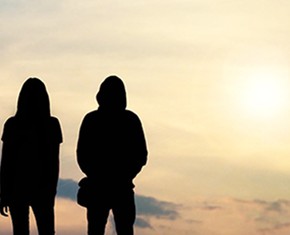The views expressed in our content reflect individual perspectives and do not represent the authoritative views of the Baha'i Faith.
A friend once told me he looks forward to the Baha’i Fast because, among its many benefits, it causes him to lose five pounds every year.
“Wow! So how much total weight have you lost, after all your years of fasting?” I asked. He replied, “None… It’s the same five pounds every year!”
Admittedly, it was a corny joke—the kind of tease we often call a “gotcha.” I fell for it, and I’ve never forgotten it. Every year since, with a smile, I’ve thought of him losing five pounds during the Fast, regaining it slowly throughout the next year, and then losing it again during the next Fast.
That friend has now passed from this world, and I love that every Fast since then reminds me of him and his occasionally silly sense of humor.
This is just one of many reflections arising in my mind during these last few days of this year’s Fast. I am also pondering the fact that after this year I will be exempted from fasting.
The annual Baha’i Fast was designated by Baha’u’llah, the founder of the Baha’i Faith, in his book of laws, called The Most Holy Book, which specifies its start date as 19 days before the spring equinox. Baha’u’llah described the practice as beginning at age 15, and as abstaining from food and drink between sunrise and sunset during those 19 days. In this same book he specified exemptions for travelers, those who are ill or engaging in hard labor, and a few other select groups—including those age 70 and older. I am now 69, so next year I will be in that category and will be exempt from fasting.
My Journey In Following God’s Laws
I declared myself a Baha’i in 1980 and have observed the Fast every year since. Although a few times I have been exempt from fasting physically, the Fast has been a constant part of my life for 38 years. Obedience to Baha’u’llah’s laws is a matter of my own conscience. Since no one can force me to observe them, and no one has the right to judge me, my understanding of the Fast and my way of observing it is a reflection of both my spiritual and physical conditions. The Baha’i writings make clear that we are to reflect on our own behavior, not that of others:
Let your thoughts dwell on your own spiritual development and close your eyes to the deficiencies of other souls. – Abdu’l-Baha, Selections from the Writings of Abdu’l-Baha, p. 203.
Action vs. Intention
At any age, any of us can observe the Fast—at least in its spiritual essence if we are not able to physically fast. If I am exempt for some reason, I can still be aware of this time through actions such as eating only when necessary, supporting others who are fasting, devoting more time for prayer and meditation, and limiting my attendance at food-related gatherings during daylight hours. As I think about this last point, I can recall many times I have postponed, adapted or rearranged social activities—as well as my exercise schedule—in respect of the Fast. Shoghi Effendi makes it clear that a similar realignment happens on the spiritual plane:
[The Fast] is essentially a period of meditation and prayer, of spiritual recuperation, during which the believer must strive to make the necessary readjustments in his inner life, and to refresh and reinvigorate the spiritual forces latent in his soul. – Shoghi Effendi, Directives from the Guardian, pp. 28-29.
It is entirely possible for someone to comply with the Fast by abstaining from food and drink from sunup to sundown for 19 days and yet not fulfill the spirit of the Fast. Likewise, a person with an exemption—whether due to travel, age, or another reason—can fulfill the meaning and purpose of the Fast even if they need to eat or drink during daylight hours. Abdu’l-Baha helps us distinguish between outward actions and their spiritual or inner essence:
This material fast is an outer token of the spiritual fast; it is a symbol of self-restraint, the withholding of oneself from all appetites of the self, taking on the characteristics of the spirit, being carried away by the breathings of heaven and catching fire from the love of God. – Abdu’l-Baha, Selections from the Writings of Abdu’l-Baha, p. 70.
At Any Age—Including After 70
As I grow with the years, I am gradually understanding more and more about the relationship between my actions and my intentions. I now realize that, regardless of whether I choose to voluntarily abstain from food and drink after the age of 70, I can always participate in the spiritual essence of the Fast:
Fasting is of two kinds, material and spiritual. The material fasting is abstaining from food or drink, that is, from the appetites of the body. But spiritual, ideal fasting is this, that man abstain from selfish passions, from negligence and from satanic animal traits. Therefore, material fasting is a token of the spiritual fasting. – Abdu’l-Baha, Star of the West, Volume 3, p. 305.
With or without physical nourishment, and regardless of what the calendar or the clock says, I can frequently call to mind beautiful quotations, such as this:
Blessed is the one who through the heat generated by the Fast increaseth his love, and who, with joy and radiance, ariseth to perform worthy deeds. – Baha’u’llah, quoted in The Importance of Obligatory Prayer and Fasting.
Spiritual Growth
Fasting is the cause of awakening man. The heart becomes tender and the spirituality of man increases. – Abdu’l-Baha, Star of the West, Volume 3, p. 305.
As I think about reaching this stage of life, I am grateful for being healthy and engaged in daily activity that gives me a sense of purpose. I believe that however my understanding of the Fast evolves, and whatever actions I choose now and in the future, being a Baha’i will continue to present me with never-ending opportunities for spiritual growth, serving others, and exploring the meaning of the words of God. And who knows, along the way, I might even lose five pounds.
















Comments
Sign in or create an account
Continue with Googleor